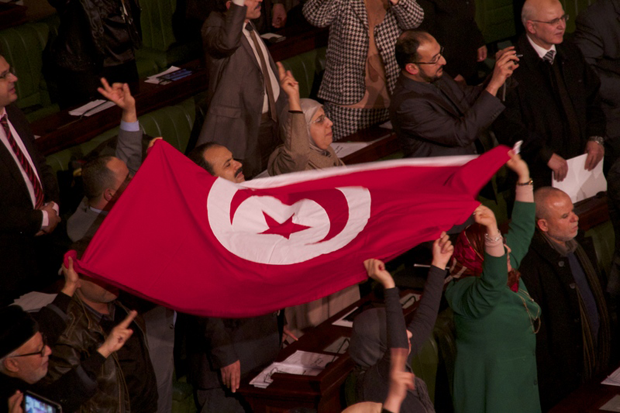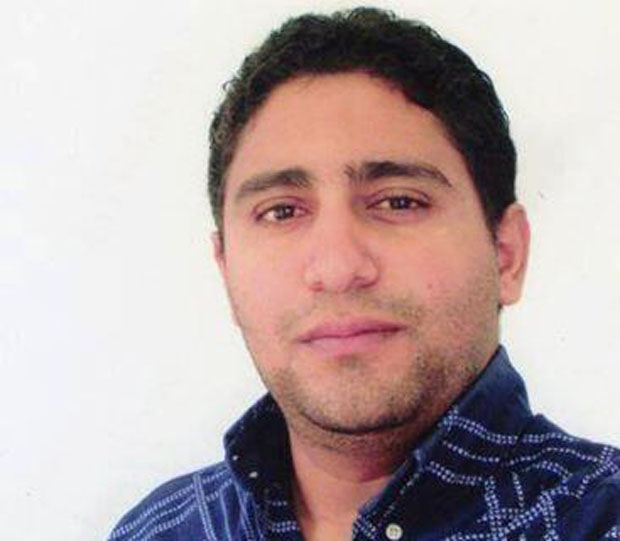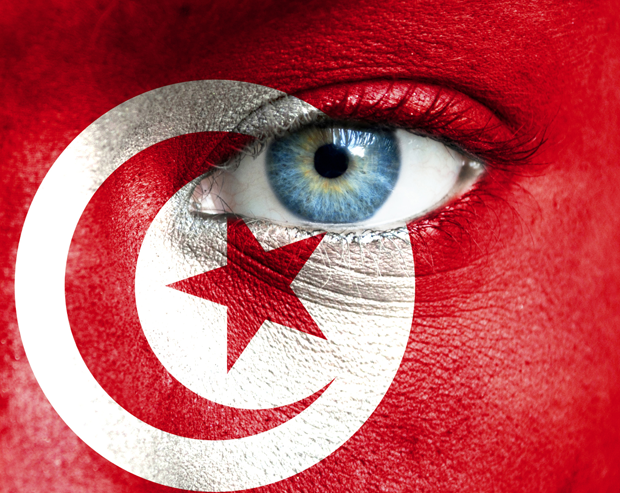Index relies entirely on the support of donors and readers to do its work.
Help us keep amplifying censored voices today.

After decades of dictatorship and two years of arguments and compromises, Tunisians finally have a new constitution laying the foundations for a new democracy. Deputies celebrating the ratification of the new constitution for Tunisia. Photo: Mohamed Krit / Demotix
The Arab Network for Human Rights Information (ANHRI), a human rights umbrella organisation based in Cairo, issued a statement on 3 February strongly denouncing a recent attack on journalists in Tunisia. The incident saw a presenter and cameraman working for attacked by 5 members of the Tunisian General Labour Union.
The attack of 29 January happened as journalists working for satellite channel al-Mutawasit attempted to cover a strike outside the Tunisian General Labour Union’s provincial headquarters in Sfax. Tunisian news site Hour News reports that 5 union members attacked the two-man crew, threatening them and seizing recording equipment. The equipment was returned only after intense negotiations, and was found stripped of memory cards documenting the incident.
According to al-Mutawasit, this is far from the first such incident. In fact, they claim to have been victim to “a fierce onslaught” by the security services. Officials from the channel allege that, after a string of interrogations, eight members of the security forces stormed the studio on 31 October 2013, during a live discussion about the drafting of a new constitution. According to the presenter Salih Atiya, the officials gave no hint as to the justification for their surprise visit, and refused to give their names for security reasons.
The most recent confrontation on 29 January, and the increased incidence of attacks on journalists in the preceding months, has led the Media Protection League of Tunisia to issue an open letter, dated 2 February, to Tunisia’s new prime minister Mehdi Jomaa. In the letter, the group demanded a review of current legal protection for journalists, especially the hotly-debated Press Laws of 2011, which continue to be legally enforced despite controversy surrounding their contents.
This string of events, which appear to constitute a crackdown on the freedoms enjoyed by Tunisian television, print and radio broadcasters, comes amid growing optimism for the state of freedom of expression in other areas. Recent reports that Jabeur Mejri, sentenced to 7 ½ years in prison over a Facebook post, is to be released have sparked hope that the judiciary is becoming more mindful of human rights legislation.
Moreover, the signing of Tunisia’s new constitution on 27 January, after more than 2 years of wrangling, generated enthusiastic praise from inside the country and out. Prominent Tunisian human rights advocate Lina Ben Mhemni reported that it contains “some victories, but is not a triumph”, while others outside Tunisia were less measured. According to Women Living Under Muslim Law, it is a “progressive and monumental” document, one that makes Tunisia more progressive than the US with regards to women’s and workers’ rights, as well as health care and climate change. The Doha Centre for Media Freedom issued a specific statement praising the constitution for “enhancing freedom of expression“, detailing clauses that insist on “the freedom of access to information”.
The ratification of Tunisia’s new constitution undoubtedly marks an important victory for progressives in the country. However, the attack of 28 January and the events leading up to it leave one wondering how far press freedoms now enshrined in law will be protected in practice.
This article was published on 10 February 2014 at indexoncensorship.org

The imprisonment of Jabeur Mejri over the publication of prophet Muhammad cartoons on his Facebook page is set to come to an end soon, reports Tunisian local media.
Mohamed Attia, vice-president of the Tunisian League for Human Rights (LTDH) told privately-owned radio station Shems FM that Mejri will soon be released, and that he will travel to Sweden where he has allegedly obtained political asylum. The announcement comes after civil society groups visited Mejri in prison on 21 January.
The initiative was led by the International Federation for Human Rights (FIDH) and included representatives from the LTDH, the Tunisian Forum for Socio Economic Rights (FTDES) and Mejri’s support committee.
Mejri has been in prison for nearly two years for posting cartoons of the Prophet Muhammad on his Facebook page. He was sentenced to a seven-and-a-half year jail term for “publishing material liable to cause harm to public order or good morals”, “insulting others through public communication networks” and “assaulting public morals”.
His friend Ghazi Beji, who received the same sentence in absentia after fleeing the country, obtained political asylum in France last year.
“I cannot enjoy my freedom in Tunisia. So, I have to leave my country,” Jabeur told Henda Chennaoui, a member of his support committee, during last week’s visit.
But in order to leave the country, Mejri must first obtain a presidential pardon. Despite Tunisian president Moncef Marzouki promising this on a number of occasions, he has so far not kept his pledge.
Meanwhile, Tunisia’s National Constituent Assembly (NCA) overwhelmingly approved a new constitution on Sunday. Though the charter enshrines freedom of expression, provisions that restrict free speech over religious issues have raised concerns.
Article 6, on freedoms of belief, conscience and religious practice, tasks the State with “protecting sanctities”. The article was expanded in early January to ban “Takfir” (apostasy accusations), at the request of opposition representatives in the NCA. The same article was further amended last week to prohibit the “undermining of sanctities”.
“The state sponsors religion, guarantees freedom of belief and conscience and religious practices, protects sanctities, and ensures the neutrality of mosques and places of worship away from partisan instrumentalisation. The state commits to spreading values of moderation and tolerance, and to protect the sacred and prevent its undermining. [The state] also commits to ban and fight accusations of apostasy (“takfir”) hate speech and incitement violence,” it states.
“Article 6 remains the shame of this constitution: a clear and definite restriction of free speech,” Amira Yahyaoui, president of human rights NGO Albawsala, tweeted on 23 January.
“There are several vague points that open the door to the return of censorship, especially with the establishment of the protection of the Sacred [notion],” Lotfi Azouz, director of the Tunis bureau of Amnesty International said at a press conference on Saturday. Free speech provisions in the constitution are “chained up by principles that could harm this freedom”. He further added that article 6 “establishes censorship in the name of protecting the sacred”.

(Photo illustration: Shutterstock)
Tunisia’s National Constituent Assembly (NCA) is voting on a 146-article constitution, following a political crisis which put the country’s democratic transition on hold after the assassination of opposition deputy Mohamed Brahmi last July.
The NCA, where the Islamist Ennahdha Movement enjoys a 40% majority, was elected in October 2011 to draft a new constitution. To be adopted, each article requires a simple majority vote. NCA deputies will then have to approve the text in its entirety by a two-thirds majority.
Articles that guarantee freedom of expression, the rights to access information, protest and assembly, and to form unions, associations and parties were adopted last week. The charter also bans prior censorship on freedoms of thought, conscience, expression and publication (article 30) and enshrines freedom of creation (article 41) and the right to privacy and personal data protection (article 23). Article 48 further states that no future constitutional amendments that violate human rights and freedoms could be introduced to the text.
But, ironically, Tunisia’s self proclaimed progressive and secular opposition stand behind the introduction of an anti-free speech clause in the text. The NCA adopted an amendment to article 6 of the draft constitution banning Takfir (apostasy accusations). Article 6 guarantees freedoms of belief, conscience and religious practice.
On 5 January, the vote on the constitution was interrupted over death threats received by Popular Front deputy Mongi Rahoui. He said he received death threats following declarations made by Habib Ellouze, another NCA representative from Ennahdha. Speaking to the media, Ellouze referred to Rahoui as an “enemy to Islam”. The Interior Ministry confirmed the death threats against Rahoui and placed him under police protection.
“What [Ellouze] said yesterday, that I am an enemy of Islam, has lead to death threats against me”, Rahoui said at the assembly’s plenary session of 5 January. “How much more blood must there be before we understand that we are united”, he added. Rahoui was referring to the assassination of two other fellow Popular Front leaders, Chokri Belaid and Mohamed Brahmi. Belaid, in particular, a staunch critic of Islamists was before his assassination subject to fatwas labelling him as a ‘Kafir’ and an ‘enemy to Islam’ who should be killed.
Following Rahoui’s declaration, NCA deputies from the opposition demanded a revote on article 6 to add a clause ‘banning takfir and incitement to violence’. The clause was approved by 131 votes. But by moving to ban Takfir, Tunisia’s opposition acted out emotionally and without taking into consideration the chilling effect a similar clause could have on free speech. The banning of “apostasy accusations” could only open the door to more restrictions on free speech.
“In just few hours, we will be able to say that the opposition put up in place the first rock in the way of free expression”, Amira Yahyaoui, president of Albawsala, a transparency NGO tracking the NCA’s activities, tweeted before the vote. “How is it nice to watch our representatives unanimously voting in favour of draconian laws”, she added in another tweet.
Following to the opposition’s demands for a constitutional ban on Takfir, Ennahdha’s deputies also called for criminalisation of blasphemy. But, for lack of consensus among the negotiating NCA representatives, the suggestion was not submitted for a vote.
Initially, Tunisia’s Ennahdha did seek to ‘criminalise attacks on sanctities’ in a first draft of the constitution. However, those plans were dropped following negotiations with the other two parties in the ruling coalition. Article 6, still however includes a vague phrase tasking the State with “protecting sanctities” without specifying how, or defining and listing these sanctities.
Meanwhile, Tunisia’s recently established broadcast media regulator, the Independent High Authority for Audiovisual Communication (better known as HAICA) repeatedly expressed its reservations about the draft constitution. HAICA was established by decree 116 on freedom of the media, which was issued on 2 November 2011, to regulate the broadcast media sector.
On a positive move, the constituent assembly incorporated HAICA into the draft constitution. However, the HAICA board criticised provisions in the text threatening the authority’s independence and limiting its prerogatives. Article 122 of the draft constitution states that the Parliament shall elect HAICA’s board members. The media regulator says that this selection process will ‘strip HAICA from its independence’ and make it ‘submissive to the [parliamentary] majority’. Under article 124, HAICA has an ‘advisory’ mission and is not attributed ‘regulatory’ powers which would allow it to regulate and organise the broadcast sector as it is stipulated by decree 116.
The two articles are awaiting NCA’s approval as deputies will first have to discuss and vote on chapters related to the executive branch and the judiciary.
This article was posted on 14 Jan 2014 at indexoncensorship.org

(Photo illustration: Shutterstock)
Tunisian privacy advocates are concerned about a new cyber crime investigative body: the Technical Telecommunications Agency (better known by its acronyms ATT or A2T).
The agency was created by the Tunisian government under decree 2013-4506 issued on 6 November. It is tasked with “providing technical support to judicial investigations into information and communication crimes” (article 2 of decree ).
As soon as the creation of ATT was made public, netizens expressed their concern of a comeback of the despicable Ammar 404 (nickname attributed to internet censorship and surveillance under the Ben Ali regime). Others described the newly established agency as “Tunisia’s NSA”.
“Fears about a Tunisian NSA are justified”, Douha Ben Youssef an internet freedom activist said.
“The ICT Ministry is justifying the existence of A2T the way Ben Ali justified the need for a control of information flow under the pretext of counterterrorism”, she adds.
Ben Youssef is also concerned about the lack of transparency and civil-society participation in drafting decree 4506.
“There was not a single multi-stakeholder debate about the decree while it was a draft”, she says.
While acknowledging the need to “monitor criminals and terrorists’ activities in this digital age”, Raed Chammem, a member of the Pirate Party shares Ben Youssef’s fears.
“The fact that this agency was dropped as it is with no external supervision, in a country with a history full of abuses in this field, is very suspicious”, Chammem said.
The decree is “too vague. It mentions cyber-crimes without providing a clear definition about the nature of these crimes or specifying them”, he added.
Tunisia does not have laws addressing cybercrime or clearly determining “ICT crimes” mentioned in the decree. This legal void could be problematic considering the country’s vague ICT legislation and repressive laws.
Article 2 of decree 4506 states that ATT is tasked with the “reception and processing of investigation orders… stemming from the judicial authority, in accordance with the legislation in effect”.
Without specifying “the legislation in effect”, users could be investigated and put under surveillance by the ATT under criminal defamation and insult laws.
“Judges do not assess the seriousness of putting certain types of internet content under surveillance”, Moez Chakchouk CEO of the Tunisian Internet Agency (ATI) told Index.
Despite the absence of a legal text requiring the agency to practice surveillance, ATI has been tasked with policing the Internet and assisting the judiciary to investigate cases of cyber crime amidst a legal and and institutional vacuum. Though, the establishment of ATT is set to bring an end to such tasks.
Chakchouk says that many of the surveillance court orders received by ATI after the revolution have nothing to do with cases of counter terrorism or national security but are rather related to defamation.
“A crime in the cyberspace is not defined within the meaning of the Tunisian law. A simple facebook post or a tweet could be considered as a serious crime by these people [judiciary]”, he said.
In 2012, the Ministry of Information and Communications Technology (ICT) consulted ATI about a new surveillance agency. The ATI had suggested the creation of an independent and permanent committee tasked with responding to court requests and made up of judges and civil-society actors, ATI chief declared to Index.
ATI’s suggestions “had been completely ignored”, he said.
Under the current decree, ATT is far from being an independent entity.
The agency’s director-general and department directors are “named by decree on the proposal of the ministry of information and communications technology”, (articles 4 and 12).
While an oversight committee established by the decree “to ensure the proper functioning of the national systems for controlling telecommunications traffic in the framework of the protection of personal data and civil liberties”, is dominated by government representatives appointed from the ministries of ICTs, Human Rights and Transitional Justice, Interior, National Defense, and Justice.
Tunisia’s interim authorities have failed to introduce real reforms in order to cut ties with the surveillance abuses of the past. Before taking the step to establish a surveillance entity the priority should have been repealing the dictatorship era laws and legally consolidating personal data protection.
Last year, the National Authority for the Protection of Personal Data (INPDP), Tunisia’s Data Protection Authority, was working on a draft of amendments to the 2004 privacy law.
The proposed amendments’ aims were to consolidate the authority’s independence from government interference and make state authorities’ collection and processing of personal data without the consent of the authority not possible. But, to this date the amendments have not been voted on at the National Constituent Assembly (NCA).
“The government does not see these amendments as an urgent priority”, Mokhtar Yahyaoui head of INPDP told Index.
“Without reforms, the authority is incapable of conducting its role the way it should”, he added.
This article was posted on 2 Jan 2014 at indexoncensorship.org